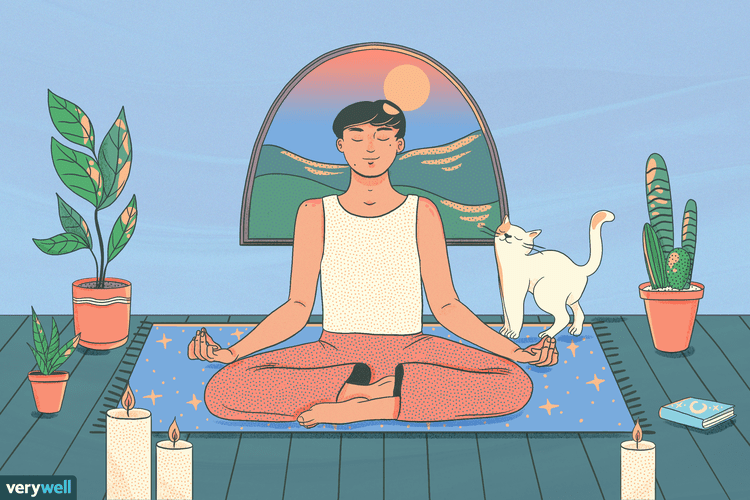How To Transform Your Day-to-Day Life With Mindfulness Meditation
“The world we have created is a product of our thinking; it cannot be changed without changing our thinking”- Albert Einstein.
Credit: Alison Czinkota / Verywell
By now, most of us have at least heard of mindfulness and that it is good for us; but do you practice it? Let’s explore the benefits of mindfulness and suggest how to get started.
A mindfulness practice investigates the relationship between the mind and body. It helps create awareness of the space between the stimulus and the response in a situation. This allows for greater freedom and distance from the situation. In essence, it will enable you to focus on yourself and escape the distractions of your external environment. It is a way of being at one with the world; it is a way of life and can be done at anytime and anywhere. One needs to adopt four key attitudes when embarking on the journey to effective mindfulness meditation:
A ‘beginners mind’ - allow yourself to be open to trying and do not worry about failing
Be patient - try not to get frustrated if you initially find it difficult.
Relax - don’t force the process; simply allow yourself to be in the situation without striving
Be present - just be right here, right now, wherever it may be. Accept the situation around you for how it is. Accept your thoughts and don’t judge them.
Interesting facts about mindfulness meditation:
Mindfulness meditation promotes stronger connections between the prefrontal cortex and amygdala areas of your brain. These areas are involved in problem-solving and modulating emotional responses.
Mindfulness programs have been shown to help develop compassion and empathy for self, as well as others, and can reduce loneliness in older adults.
An adult human can grow approximately 700 new neurons a day. The brain learns and adapts based on thought and emotional experience. This is called neuroplasticity, which meditation is proven to induce.
Credit: Dana Foundation
What are the health benefits of Mindfulness?
Well-being: Incorporating mindfulness into your morning routine will help set the tone for the day ahead and allow you to become more focused, content and optimistic. Mindfulness provides your mind the time it needs to rest and regroup. It will enable one to become more emotionally balanced and intensify your appreciation for positive experiences.
Physical: Mindfulness can help relieve stress, lower blood pressure, reduce chronic pain and improve sleep.
Mental: Studies have demonstrated that mindfulness can help with stress, anxiety and depression.
How to develop a mindfulness routine today!
Most people will try and engage with mindfulness meditation first thing in the morning to set them up for the day. One of the most challenging steps is not hitting the snooze button and going back to sleep but, instead, getting up and meditating. However, mindfulness can of course still be practised anywhere and whenever. Here’s a step-by-step guide on how to get started:
Find somewhere comfortable to sit, ideally in a place you feel calm. Some people like to dedicate a particular space in their home or environment to meditate. See what works best for you.
Sit comfortably, close your eyes and start to focus on your breathing. Breathe in through your nose and out through your mouth. Focus on the sensation of the airflow in and out of your body.
Once you have managed to keep the focus on your breathing, begin to widen your focus and become aware of the sensations and sounds around you. For example, how do your clothes feel against your skin?
Don’t judge a sensation as good or bad; embrace it and let it be.
If you feel your mind racing or losing focus, go back to your breath as an anchor to re-centre yourself.
You can start by doing just 5-10 minutes daily and build it up. The effects of mindfulness meditation is dose-related; so, the more you do, the better you should feel. Ideally, you want to aim for at least 20 minutes per session but, as always, you should do what feels comfortable for you.
Credit: Getty Images
See if you can incorporate mindfulness into your daily routine for a month and notice if it makes a difference in how you feel. It might give you that boost you need, especially as we approach the dark winter nights.
Why don’t you set yourself a challenge? Rate on a scale of 1-10 how you feel before and after incorporating mindfulness into your daily routine. For instance, you can rate: your presence and focus, whether you are able to live in the present moment even after meditating; your mental energy, whether your mind is full of vitality; emotional control, how you are able to handle strong emotions; and social connection, how well you treat others. By using this metric, you can clearly see whether mindfulness is making a difference to you.
For more articles and health tips, follow UpaCare Health and stay tuned for our weekly blog!
References
Kelly.J & Clayton.J, Foundations of Lifestyle Medicine, Board Review Manual (2021) American College of Lifestyle Medicine.
Rosenkranz. M, Davidson. R et al (2013) A comparison of mindfulness-based stress reduction and active control in modulation of neurogenic modulation, Brain Behaviour and Immunity, volume 27, pages 174-184.




